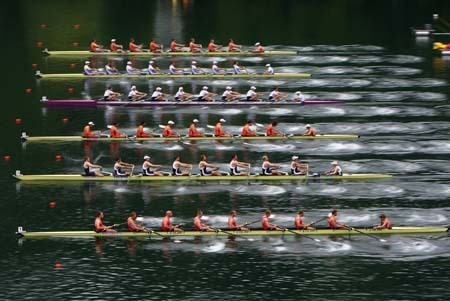The Culture Builder Hypothesis (The Male Advantage–part 3)
 That’s why the first thing men do well is compete. In fact, we can hardly help competing. I row with a bunch of guys in their 50s and 60s, well past the age when this sort of thing is supposed to matter. I don’t think we’re competing for women; that’s what biologists call an ultimate cause. But the proximate cause is that we just like to beat each other. If you put us in doubles and send us around the lake a few times, our “steady state” row invariably escalates into a race. Then we lean on our oars catching our breath just enough to start talking trash. (I lose at rowing, but pull ahead on comic insults.) The only reason this is a problem is that society now regards the almost automatic male urge to compete as silly, annoying, and often destructive. But here’s another way to look at it:
That’s why the first thing men do well is compete. In fact, we can hardly help competing. I row with a bunch of guys in their 50s and 60s, well past the age when this sort of thing is supposed to matter. I don’t think we’re competing for women; that’s what biologists call an ultimate cause. But the proximate cause is that we just like to beat each other. If you put us in doubles and send us around the lake a few times, our “steady state” row invariably escalates into a race. Then we lean on our oars catching our breath just enough to start talking trash. (I lose at rowing, but pull ahead on comic insults.) The only reason this is a problem is that society now regards the almost automatic male urge to compete as silly, annoying, and often destructive. But here’s another way to look at it:
Male social skills are the basis for civilization. Men don’t just compete one-on-one. We band together to compete against other groups, and we have been doing so since our hairy ancestors first figured out that groups were a more effective way to hunt and to wage tribal warfare. For better or worse, that’s where we learned our social skills. And it has supposedly turned us into social morons, unable to savor the deep emotional connections that resonate through the close relationships among women.
Male socializing can admittedly be fairly shallow: If women sometimes fake orgasms, men can fake entire relationships, and this can lead to, oh, misunderstandings. But our shallow social style is also functional, enabling us to move easily though a shifting array of alliances and not get bogged down too much by emotions. In a game of shirts-and-skins, or in a corporate takeover, switching sides can turn the guy you were just hating into your temporary best pal, and then you both focus together on the job at hand. (You can hate each other later.)
Men aren’t worse than women at socializing, just different. It’s a tradeoff, says Baumeister, with the social strengths of each balancing the weaknesses of the other, to the benefit of all: “While women concentrated on the close relationships that enabled the species to survive, men created the bigger networks of shallow relationships, less necessary for survival but eventually enabling culture to flourish.”
 These networks turned out to be perfectly suited to building large social systems, says Dutch psychologist Mark van Vugt, Ph.d: Group competition generated a psychology in men “which allows them to connect with large groups of, effectively, strangers and rely on them to build alliances, and once you have that, all sorts of things become possible”– tribes, small villages, political factions, nations, empires, “and even businesses, which consist of large groups of strangers cooperating with one another,” almost all founded and built up by men. You could call van Vugt’s idea the “Culture Builder” hypothesis. Unfortunately–and this is how it always seems to go for men–he dubbed it the “Warrior Hypothesis” instead.
These networks turned out to be perfectly suited to building large social systems, says Dutch psychologist Mark van Vugt, Ph.d: Group competition generated a psychology in men “which allows them to connect with large groups of, effectively, strangers and rely on them to build alliances, and once you have that, all sorts of things become possible”– tribes, small villages, political factions, nations, empires, “and even businesses, which consist of large groups of strangers cooperating with one another,” almost all founded and built up by men. You could call van Vugt’s idea the “Culture Builder” hypothesis. Unfortunately–and this is how it always seems to go for men–he dubbed it the “Warrior Hypothesis” instead.




